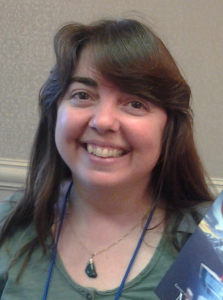A guest post by Susan Forest.
Have you noticed that readers and writers different genres of fiction can sometimes have very different approaches to story? At times readers and writers of literary fiction, and readers and writers of commercial fiction can seem to exist in very separate worlds, each knowing little about the other. As a writer who approaches my work from a commercial sensibility, I have been wrestling with this dichotomy, and over the past few years have come up with a framework that helps me with this struggle.
Two of my biggest inspirations in this struggle are Nancy Kress and Donald Maass. Nancy points out that work in any genre can be written in a more literary style or a more commercial style–or anywhere in between. For instance, although one tends to think of the genre of science fiction as primarily commercial, Margaret Atwood’s Oryx and Crake has a literary sensibility. In his 2012 book, Writing 21st Century Fiction, Donald Maass points out that the most successful books have elements typical of both commercial and literary fiction.
Neither style is better: it is the reader’s expectation that determines whether a book will be successful in its market. If a book is written from a more commercial sensibility, a reader who prefers a literary style may find the book confusing, exhausting and too focussed on external conflicts; If a book is written from a more literary sensibility, and reader who prefers a commercial style may find the book boring and too focussed on internal conflicts. Knowing some of the hallmarks of each style can help a writer to select those techniques that suit his or her purposes.
Commercial fiction, at least in the current market, often is centred on the character’s voice; in literary fiction, there is more room for the author’s voice to be heard. Commercial fiction is often fast-paced: the page-turning novel. Literary fiction may take more time to linger in beautiful imagery, to set place and era, or to develop background.
Commercial stories rely on characters who are active agents: who are impelled to take action to resolve their problems, and who are often sympathetic to the reader–or at least have human qualities that allow the reader to understand him or her, and therefore develop the desire to follow him or her. Literary characters may have more freedom to be reactive to their environments, or to have very complex and not always appealing qualities.
The point of view in a commercial story is frequently either first or third person, limited, with changes of point of view occurring only at scene or chapter breaks; readers of literary fiction are often more tolerant toward the omniscient narrator, and even to “hopping” from head to head within a scene.
Commercial fiction is usually written in scenic form, much like a movie unfolding in real time with scene breaks that indicate jump-shifts in time and/or place. There is more room in literary fiction for narration.
Commercial stories often begin in media res: in the action of the story; whereas, literary stories might take the time to set the scene before launching into the story problem.
Readers of commercial fiction may expect certain conventions to be followed in a story, such as the try/fail cycle. A murder mystery without a murder, a romance without a love story, or a fantasy without magic would be a disappointment. Literary fiction can tolerate more experimental structures that do not rely as heavily on conventions.
On the whole, stories written for a commercial audience typically resolve the conflict at the end: the hero may win or lose, but the resolution of the story’s problem is clear. In literary fiction, resolution may not be the point: an opportunity for the reader to grapple with big questions and allow big ideas to resonate in his or her psyche might be the goal instead. An example is Hemingway’s short story, “A Clean, Well-Lighted Place.” Here, a young waiter becomes impatient waiting for an old man to finish his wine and leave, because the waiter wants to go home and make love to his wife. The middle-aged waiter cautions the younger waiter to be patient. Eventually, the old man finishes his wine and leaves; the young waiter goes home and makes love to his wife; and the middle-aged waiter goes to a bar and thinks about life. The end. This ending clearly lacks resolution, but resolution was never the point. As Nancy Kress so eloquently said: the story is about death, and even Hemingway, with his ego, could not resolve, or have the final word, on death. Neither approach–resolution or resonance–is right or wrong, but the author’s choice depends on the reader’s expectations.
Naturally, there is no such thing as a “purely” literary story that has no action, resolution, driven characters, and so on; or a “purely” commercial story that has no internal conflict, authorial voice, unexpected twists, etc. All stories fall somewhere on the continuum between these extremes. Donald Maass would suggest that the best stories use elements of both. Understanding these elements and consciously choosing to include–or not–specific commercial and literary techniques in one’s story is part of the professional writer’s bag of tools.
 Three-time Prix Aurora Award finalist, Susan Forest is a writer of science fiction, fantasy and horror, and a fiction editor for Edge Press. Her stories have appeared in Asimov’s Science Fiction, Analog Science Fiction and Fact, Beneath Ceaseless Skies, OnSPEC Magazine, and The Urban Green Man, among others, and her collection of short fiction, Immunity to Strange Tales. Susan edits for Edge Press, teaches creative writing at the Alexandra Centre, and has appeared at numerous local and international writing conventions. Check her website at: www.speculative-fiction.ca.
Three-time Prix Aurora Award finalist, Susan Forest is a writer of science fiction, fantasy and horror, and a fiction editor for Edge Press. Her stories have appeared in Asimov’s Science Fiction, Analog Science Fiction and Fact, Beneath Ceaseless Skies, OnSPEC Magazine, and The Urban Green Man, among others, and her collection of short fiction, Immunity to Strange Tales. Susan edits for Edge Press, teaches creative writing at the Alexandra Centre, and has appeared at numerous local and international writing conventions. Check her website at: www.speculative-fiction.ca.


